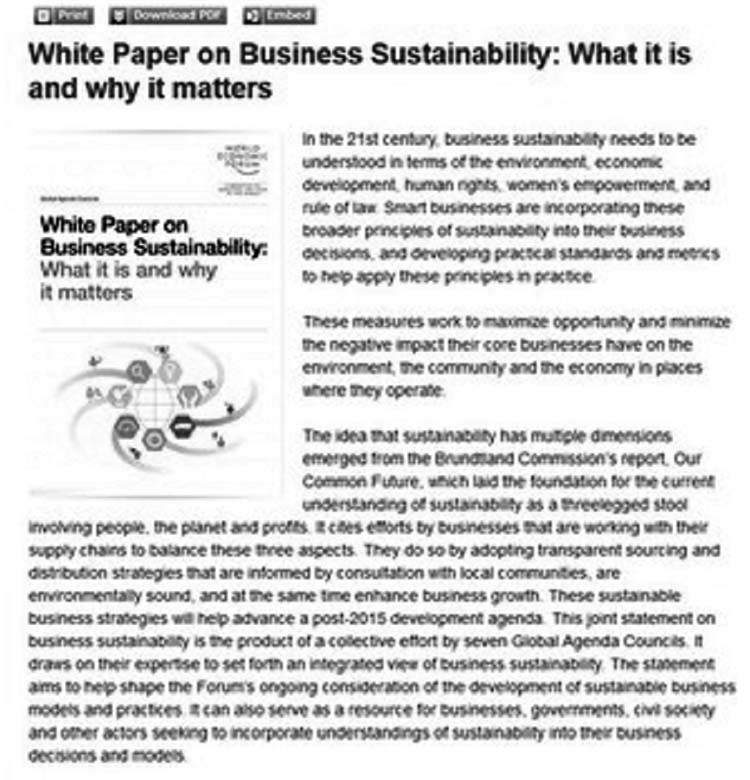
bdnews24.com :
The World Economic Forum (WEF) has outlined the dos and don’ts for sustainable business in its just published white paper, presented as a joint statement, stating why they matter.
The paper says that in this rapidly changing modern world, business sustainability must take into account human rights, women’s empowerment, rule of law, environment, economic development and corruption.
Better understanding of the term will help businesses to devise business models that can maximize opportunities and reduce adverse impacts of business on the environment, economy and people, says paper titled, ‘White Paper on Business Sustainability: What it is and why it matters’, released on July 30.
Network of Global Agenda Councils (GAC) – a unique global community of over 1,500 leading thinkers, the foremost experts in the fields of academia, business, government, international organisations and society – prepared the paper.
The statement aims at influencing the WEF’s planned sustainable business models and practices and offering an integrated view of business sustainability.
Martina Larkin, Senior Director and Head of Global Agenda Councils of WEF, says in the statement, “This joint statement on business sustainability is the product of a collective effort by seven Global Agenda Councils. It draws on their expertise to set forth an integrated view of business sustainability.
The statement aims to help shape the Forum’s ongoing consideration of the development of sustainable business models and practices.
It can also serve as a resource for businesses, governments, civil society and other actors seeking to incorporate understandings of sustainability into their business decisions and models.”
Michael Posner, Chair Global Agenda Council on Human Rights, says, “Given the importance of this issue and the various ways in which sustainability is defined and discussed, this White Paper presents an integrated picture of business sustainability and offers a foundation to guide future work in this area.”
The paper says companies that address the issues of human rights in its decision-making and build internal systems to fulfil their commitment are in a stronger position to meet the challenges they face while doing business in a more globalised and accountable world.
Such business practices reduce risks and make it possible to take advantage of opportunities, bringing benefits to them as well as to shareholders, consumers and employees.
About logistics and the supply chain, the paper says today’s world has a stretchable production line due to globalisation.
Western and developed economies have outsourced their factories in developing nations, speeding up industrialisation in those countries.
Today, the paper says, both the retailers and logistic suppliers have to ensure working conditions and environment practices throughout the supply chain for the sake of their long-term commercial interests.
Regarding climate change, GAC feels an integrated approach consisting of public-private partnership, specifics policies to drive technology innovation and capital flows, and expansion of the markets for clean technologies, products and services are needed to address the problem.
On the issue of sustainable consumption, GAC observes that, in the coming years, the emerging middle class will add another 3.3 billion people.
Four planet Earths would be needed to meet the demand of the market.
To address the mismatch, a sustainable consumption model is needed. Companies need to educate consumers to change their behaviour when buying, using and discarding products or services.
On women’s empowerment, GAC thinks government and businesses must ensure that women have equal access to jobs, wages, and opportunities since women drive economic growth and play role in enhancing family well-being.
On the rule of law, GAC has found that businesses are often faced with challenges in an environment where the formal rule of law is lacking because of government inability to enforce it or an absence of political will.
Companies may find itself working with NGOs, civil societies, government agencies and other businesses in addressing these challenges.
On corruption and transparency, GAC says businesses have an important role to play in sustainable development.
But corruption, which equals more than 5% of global GDP, poses a huge threat to the sustainability of the business.
Business trust, which is created and sustains in a strong corporate culture, is a source of reputational capital that provides brand strength and is key to long-term business health and prosperity.
The paper concludes that the contributions of the various Global Agenda Councils offer an image of business sustainability that can begin to inform business decisions and the creation of new business models.

